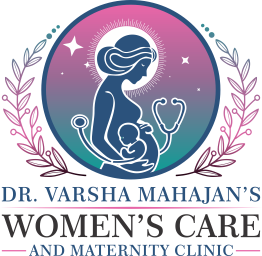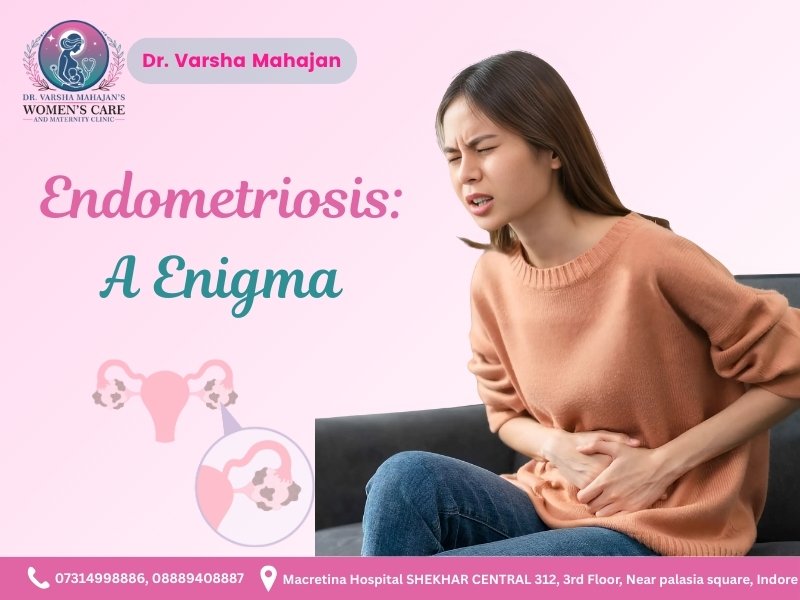Endometriosis is a common but often misunderstood condition that affects millions of women worldwide. It can cause pain, discomfort, and a range of other symptoms, and yet it is frequently misdiagnosed or overlooked. Understanding endometriosis, its symptoms, and treatment options can be life-changing for those who suffer from it. In this blog, we will explore what endometriosis is, the signs to look out for, how it impacts a woman’s health, and the treatment options available, especially for women in Indore.
What is Endometriosis?
It is a medical condition where tissue that is similar to the lining of the uterus (called the endometrium) grows outside of the uterus. This tissue can be found on the ovaries, fallopian tubes, outer surface of the uterus, and sometimes even in more distant areas like the bladder, intestines, or other organs in the pelvic region. Each month during a woman’s menstrual cycle, the tissue inside the uterus thickens, breaks down, and sheds. However, the tissue outside the uterus has no way to leave the body, causing inflammation, pain, and potentially scarring over time.
For women in Indore, it’s crucial to consult with a skilled gynecologist, such as Dr. Varsha Mahajan, to diagnose and manage the condition effectively, as it can sometimes go unnoticed for years.
Symptoms of Endometriosis
The symptoms can vary significantly from woman to woman, and some women may experience no symptoms at all. However, the most common signs include:
- Pelvic Pain: This is the most common symptom and can range from mild to severe. It often worsens during menstruation, but may also occur at other times in the cycle.
- Heavy Menstrual Bleeding: Women may experience abnormally heavy or prolonged periods.
- Pain During or After Intercourse: Pain during or after sex, particularly deep penetration, can be a common symptom of endometriosis.
- Painful Bowel Movements or Urination: This is particularly noticeable during menstruation.
- Infertility: Endometriosis can interfere with conception, and it’s one of the leading causes of infertility.
- Fatigue: Many women with endometriosis report feeling tired and drained, likely due to pain and the inflammation associated with the condition.
- Digestive Problems: Women with endometriosis may also experience bloating, nausea, diarrhea, constipation, or irritable bowel syndrome (IBS)-like symptoms.
If you are experiencing any of these symptoms, it is important to seek medical advice, particularly from a gynecologist who specializes in women’s health like Dr. Varsha Mahajan in Indore, to receive a proper diagnosis and treatment plan.
What Causes Endometriosis?
The exact cause of endometriosis remains an enigma, but several theories exist:
- Retrograde Menstruation: This theory suggests that instead of shedding the menstrual blood through the vagina, some of it flows backward through the fallopian tubes into the pelvic cavity. The tissue from this backward flow may then begin to implant and grow outside the uterus.
- Embryonic Cell Transformation: Some researchers believe that during puberty, certain cells in the pelvic cavity transform into endometrial-like cells under the influence of hormones.
- Genetics: There may be a genetic component to endometriosis, as it often runs in families. If your mother or sister has endometriosis, you are more likely to develop it.
- Immune System Disorders: A malfunctioning immune system might allow endometrial-like tissue to grow outside the uterus.
Regardless of the cause, it’s essential to consult an experienced professional for proper treatment options. Dr. Varsha Mahajan in Indore provides specialized care for women suffering from endometriosis and helps manage the symptoms effectively.
Diagnosis of Endometriosis
Diagnosing endometriosis can be tricky because its symptoms often overlap with other conditions such as ovarian cysts, pelvic inflammatory disease (PID), or irritable bowel syndrome (IBS). To get an accurate diagnosis, doctors typically start with a detailed medical history and a pelvic exam.
If endometriosis is suspected, further diagnostic tools may include:
- Ultrasound: An ultrasound may be used to check for cysts associated with endometriosis, but it cannot confirm the presence of the disease.
- MRI: This imaging technique can help visualize the extent of endometrial tissue outside the uterus.
- Laparoscopy: This is the gold standard for diagnosing endometriosis. In this minimally invasive surgery, the doctor makes small incisions in the abdomen to insert a camera and visually inspect the pelvic organs for signs of endometrial tissue. A biopsy may also be taken.
If you live in Indore, Dr. Varsha Mahajan offers advanced diagnostic techniques and is experienced in the laparoscopic procedure to provide a definitive diagnosis and treatment plan for endometriosis.
Treatment Options for Endometriosis
While there is no cure for endometriosis, various treatment options can help manage the symptoms and improve quality of life. The right treatment depends on the severity of the condition, your symptoms, and whether you wish to maintain fertility. Here are the main treatment options:
-
Pain Management
For women experiencing mild to moderate pain, over-the-counter pain relievers like ibuprofen (Advil) or naproxen (Aleve) can be effective. These medications help reduce pain and inflammation associated with endometriosis.
-
Hormonal Therapy
Hormonal treatments aim to reduce or eliminate the menstrual cycle, which in turn helps reduce the growth of endometrial tissue. Options include:
- Birth control pills: These regulate menstruation and reduce the amount of bleeding and pain.
- GnRH agonists: These drugs induce a temporary menopause-like state to stop the growth of endometrial tissue.
- Progestins and IUDs: These can help reduce bleeding and pain by thinning the uterine lining.
-
Surgical Treatment
If symptoms are severe or if other treatments have not been effective, surgery may be recommended. The most common surgeries include:
- Laparoscopic surgery: A minimally invasive procedure to remove or destroy endometrial tissue.
- Hysterectomy: In cases of severe endometriosis, the uterus and possibly the ovaries may be removed to provide permanent relief.
-
Fertility Treatment
For women experiencing infertility due to endometriosis, assisted reproductive technologies such as in vitro fertilization (IVF) may be recommended.
Living with Endometriosis: Coping and Support
Living with it can be challenging, but with the right treatment and lifestyle changes, many women can manage their symptoms effectively. Here are a few tips to cope:
- Maintain a healthy lifestyle: Regular exercise, a balanced diet, and stress management techniques such as yoga or meditation can help reduce symptoms.
- Seek emotional support: Endometriosis can be emotionally taxing. Consider joining a support group or speaking with a counselor to help manage the psychological impact of the condition.
- Stay informed: Keep up with the latest research on endometriosis and treatment options, and work closely with your doctor to find the best care plan.
Endometriosis Care in Indore
If you’re struggling with endometriosis, it’s essential to consult with an expert who can guide you through the diagnosis and treatment process. Dr. Varsha Mahajan in Indore specializes in diagnosing and treating endometriosis, offering personalized care tailored to your unique needs. With 13 years of experience and a compassionate approach, Dr. Mahajan is dedicated to improving the quality of life for women suffering from endometriosis.






